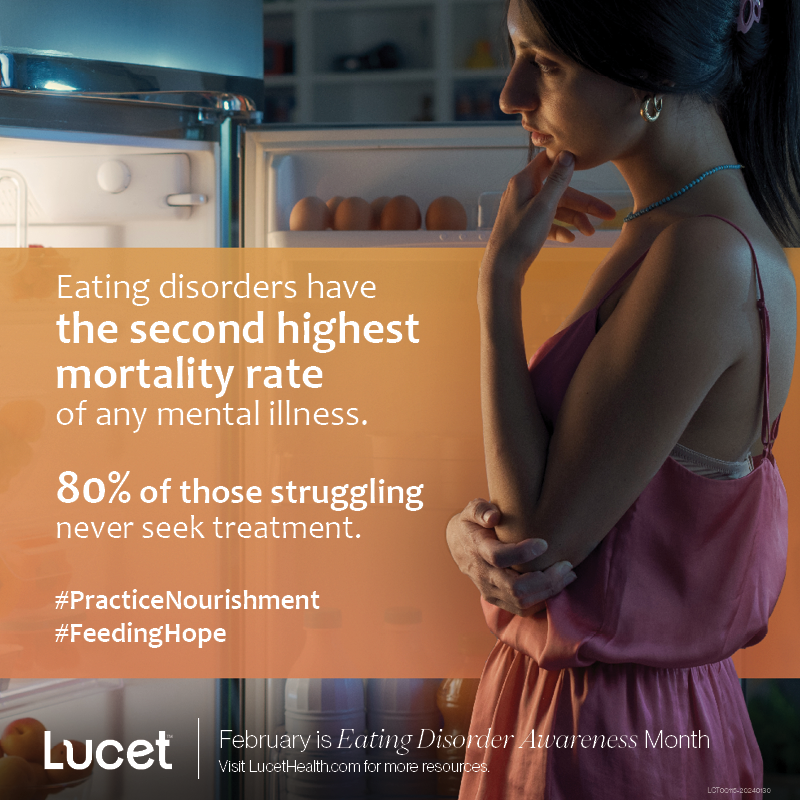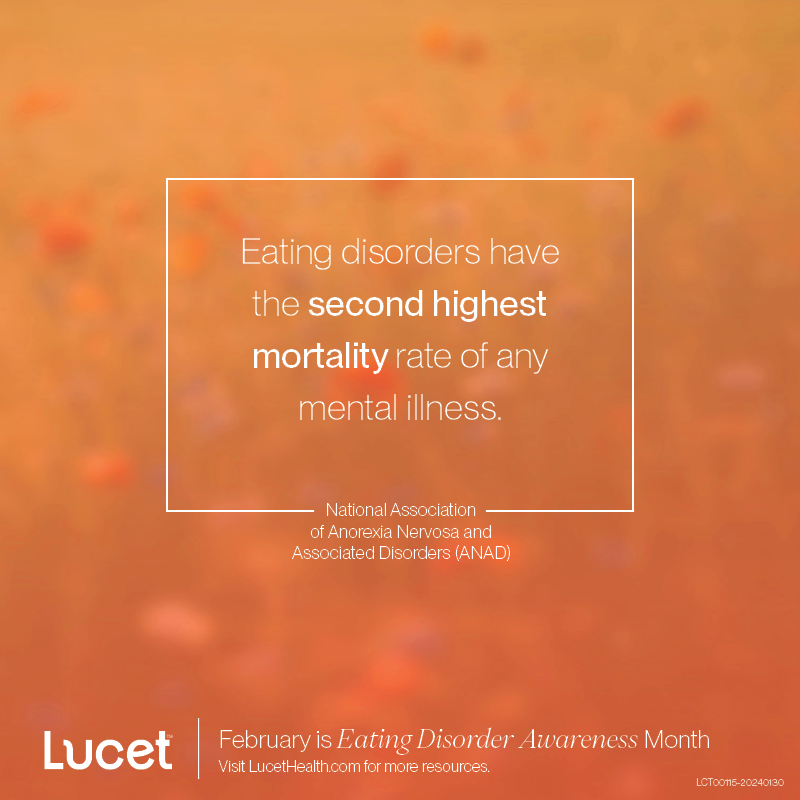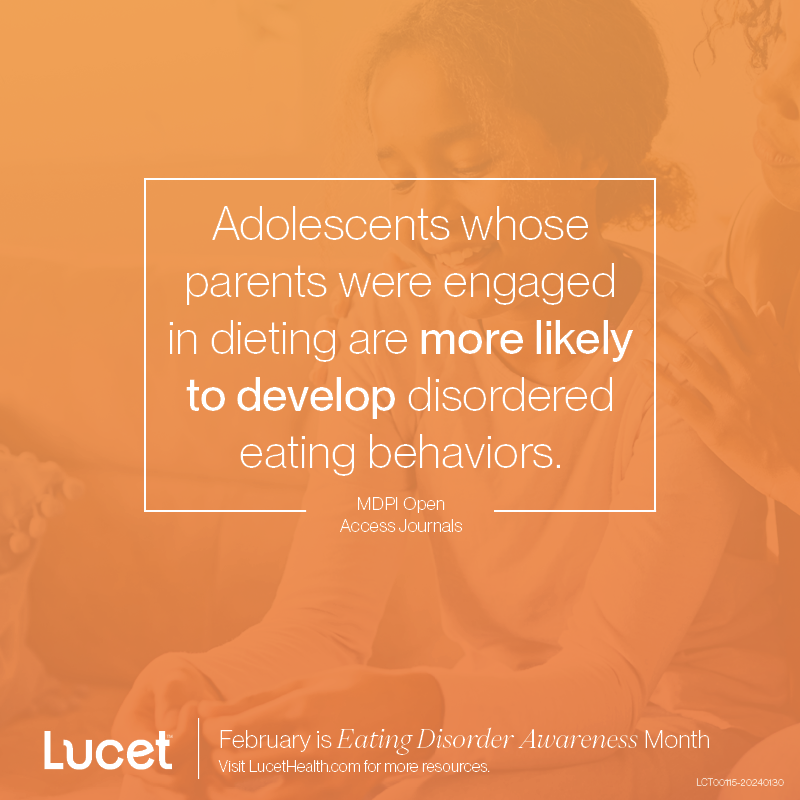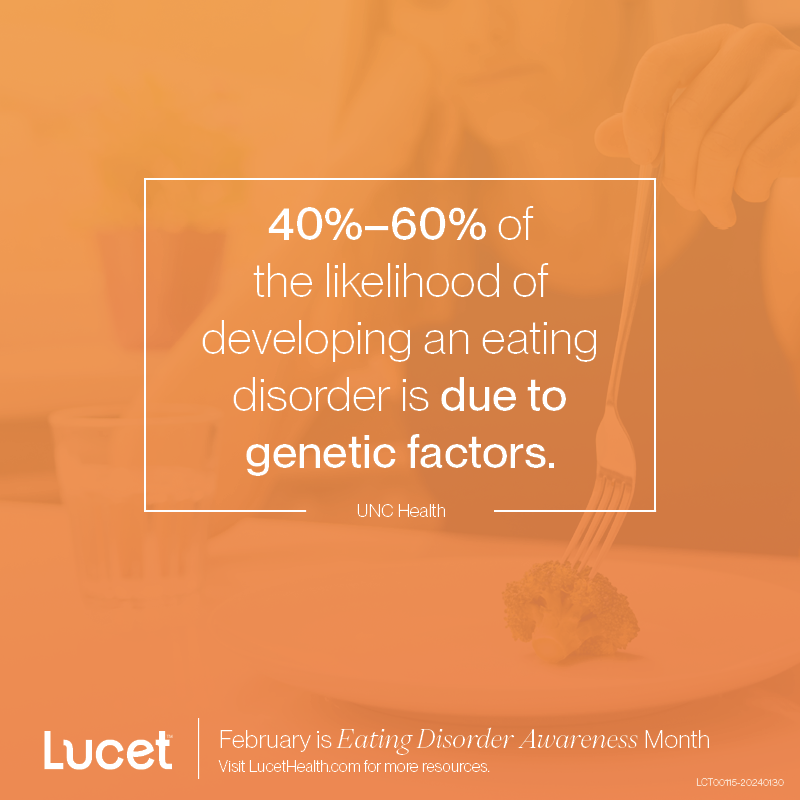Join the Conversation:
Eating Disorder Awareness Month
February is Eating Disorder Awareness Month
Use the language below when posting about Eating Disorder Awareness on social media. Follow Lucet to see our eating disorder awareness content and share it on your account. You can also follow the steps below to post from your own account.
Create posts on your social media accounts
- Log in to one of your active social media channels to create a post.
- Scroll below and choose your desired social post language.
- Copy the caption (including hyperlinks) and paste it into your social post editor.
- Right click on the corresponding graphic below to save it to your computer, then upload the graphic to your post to accompany the caption.
- Be sure to tag @LucetHealth. To tag any organizations listed in the caption, type @ in the social post editor, then start typing the desired organization. Choose the organization you want to tag from the dropdown list of pages that appear.
- Include the following hashtags in your caption: #PracticeNourishment #FeedingHope
- Post!
Share Poster/Entire Toolkit

Eating disorders are among the deadliest mental illnesses because of their devastating effect on our brain’s ability to nourish our bodies. With adolescents at high risk, parents can play a particularly important role in detecting these disorders. February is Eating Disorder Awareness Month — help us spread the facts and educate others about how to help. You can print, distribute or share via social media the materials in our toolkit during February and all year long.
If you or someone you know is struggling with an eating disorder, you can find additional resources through the @National Eating Disorders Association (NEDA) or call the @National Association of Anorexia Nervosa & Associated Disorders (ANAD) Helpline at 888-375-7767.
Access Lucet’s Eating Disorder Awareness Toolkit: https://lucethealth.com/members/resources/eating-disorder-toolkit/
#PracticeNourishment #FeedingHope
Share Tips

Despite their prevalence, eating disorders can be difficult to detect. Individuals beginning to struggle with disordered eating may display one or more symptoms, or try to conceal symptoms due to feelings of shame. Here’s what to look for to help. If you or someone you know is struggling with an eating disorder, you can find additional resources through the @National Eating Disorders Association (NEDA) or call the @National Association of Anorexia Nervosa & Associated Disorders (ANAD) Helpline at 888-375-7767.
https://lucethealth.com/members/resources/eating-disorders-know-the-signs/
#PracticeNourishment #FeedingHope

How can you tell the difference between maintaining a healthy lifestyle and the beginnings of disordered eating? Discerning this can be challenging, but recognizing changes in behavior in someone you know may help save their life. If you or someone you know is struggling with an eating disorder, you can find additional resources through the @National Eating Disorders Association (NEDA) or call the @National Association of Anorexia Nervosa & Associated Disorders (ANAD) Helpline at 888-375-7767.
https://lucethealth.com/members/resources/when-does-dieting-become-unhealthy/
#PracticeNourishment #FeedingHope
Share Articles

The language parents use around health and diet plays a pivotal role in shaping the attitudes and behaviors of their children. It’s important we choose words carefully when speaking about diet so children can form a positive body image and healthy eating habits, especially through adolescence. If you or someone you know is struggling with an eating disorder, you can find additional resources through the @National Eating Disorders Association (NEDA)) or call the (@National Association of Anorexia Nervosa & Associated Disorders (ANAD) Helpline at 888-375-7767.
https://lucethealth.com/members/resources/health-diet-language-matters-to-kids/
#PracticeNourishment #FeedingHope

Recent advancements in neuroscience have shed light on the intricate workings of the brain in individuals with eating disorders. The likelihood of individuals to develop an eating disorder goes beyond external pressures and is also affected by our genetics. This is important to understand in how we approach treatment. If you or someone you know is struggling with an eating disorder, you can find additional resources through the @National Eating Disorders Association (NEDA) or call the @National Association of Anorexia Nervosa & Associated Disorders (ANAD) Helpline at 888-375-7767.
https://lucethealth.com/members/resources/how-eating-disorders-affect-our-brain/
#PracticeNourishment #FeedingHope

Alaina was a typical preteen girl trying to navigate adolescence, finding friends and identity through her softball team. But when her sports training triggered disordered eating, her mom knew she needed help.
After working hard to manage her symptoms at a residential facility, Alaina was connected with Karen, a Lucet care manager. This is her inspiring story. If you or someone you know is struggling with an eating disorder, you can find additional resources through the @National Eating Disorders Association (NEDA) or call the @National Association of Anorexia Nervosa & Associated Disorders (ANAD) Helpline at 888-375-7767.
https://lucethealth.com/members/resources/overcoming-teen-anorexia-alaina-story/
#PracticeNourishment #FeedingHope
#PracticeNourishment #FeedingHope
If you or someone you know is struggling with an eating disorder, you can find additional resources through the National Eating Disorders Association (NEDA) or call the National Association of Anorexia Nervosa & Associated Disorders (ANAD) Helpline at 888-375-7767.
Quick References
For benefit information, call the number on the back of your insurance card.
Autism Helpline
877-563-9347
General Inquiries
877-887-1797
Substance Use Hotline
877-326-2458